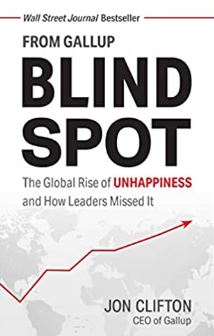
Book Review on the Blind Spot: The Global Rise of Unhappiness and How Leaders Missed It

A book review by UHA Workplace Wellness Advisor Roland Manangan
Summary of Blind Spot: The Global Rise of Unhappiness and How Leaders Missed It by Jon Clifton
Clifton’s ‘Blind Spot’ is a research-driven investigation into the pessimistic data around what is making us all less happy since the turn of the century.
In ‘Part I: The Leadership Blind Spot: Happiness and Wellbeing’ and ‘Part 2: Addressing the Blind Spot: Measuring Happiness and Wellbeing’, Clifton shares the data gathered from Gallup and, equally important, how to properly look at the data to better understand the problem and what they believe to be the best approach to a solution. The problem can be best summed up by a quote, cited on page 71, Bobby Kennedy in 1968:
“…But even if we act to erase material poverty, there is another greater task, it is to confront the poverty of satisfaction – purpose and dignity – that afflicts us all.
Yet the gross national product does not allow for the health of our children, the quality of their education or the joy of their play. It does not include the beauty of our poetry or the strength of our marriages, the intelligence of our public debate or the integrity of our public officials.
It measures neither our wit nor our courage, neither our wisdom nor our learning, neither our compassion nor our devotion to our country, it measures everything in short, except that which makes life worthwhile.”
How can leaders solve unhappiness in the workplace?
It’s complicated. However, understanding the value and shortcomings of both objective data (factual) and subjective data (personal interpretation), will help build a foundation for the remaining chapters while also giving the reader a better understanding of their own surveys, so don’t skip this.
Valuable lessons from Gallup
Through their analysis, Gallup suggests that there are five major focus areas that best address the problem of Global Unhappiness. These “Five Elements” are covered in ‘Part 3: What Makes a Great Life?’ In chapter eight through chapter twelve (roughly 50 pages), context is everything, so I would strongly suggest you read through each element to better understand, and more importantly, feel the issues that are covered. Here are each of the elements, in short:
- Work: Measuring whether people love or hate their jobs (See Gallup Qs on page 97)
- Finance: Money does not buy happiness, but it is hard to be happy without it.
- Community: Having a safe space to work and live; broken communities are built on fear.
- Physical: Food insecurity and obesity; Having more access to healthier foods.
- Social: Relationships at work are equally important as relationships outside of work.
‘Part 4: Four Unanswered Questions’ dives into some observational research around four ideas:
- How creating a better world for women will create a better world for us all.
- The anomaly of Singapore and the effect of emotions on data.
- Post-traumatic stress and its relationship to subjective data.
- The COVID-19 effect on subjective data.
In the last section, ‘Part 5: What Leaders Can Do to Improve How People’s Lives Are Going’, Clifton presents the suggestions for both public and private sector leaders. If you are looking to take action in either sector, I recommend you read both chapters, as the recommendations are applicable across sectors.
Recommendations
Clifton does a phenomenal job at presenting all the research gathered by Gallup, and more importantly, how it all comes together to present us with the rising problem of global unhappiness.
Who should read the Blind Spot?
The analyst. If you are a data-hound and want to better understand the underlying issues, then this book is right up your ally.
The creative. If you are the creative type, someone that can take the stats and go from there in creating your own ideas on how to help solve the problem, then this book is a great starting point for you as well.
Need assistance to get started? Contact the workplace wellness team at [email protected].
